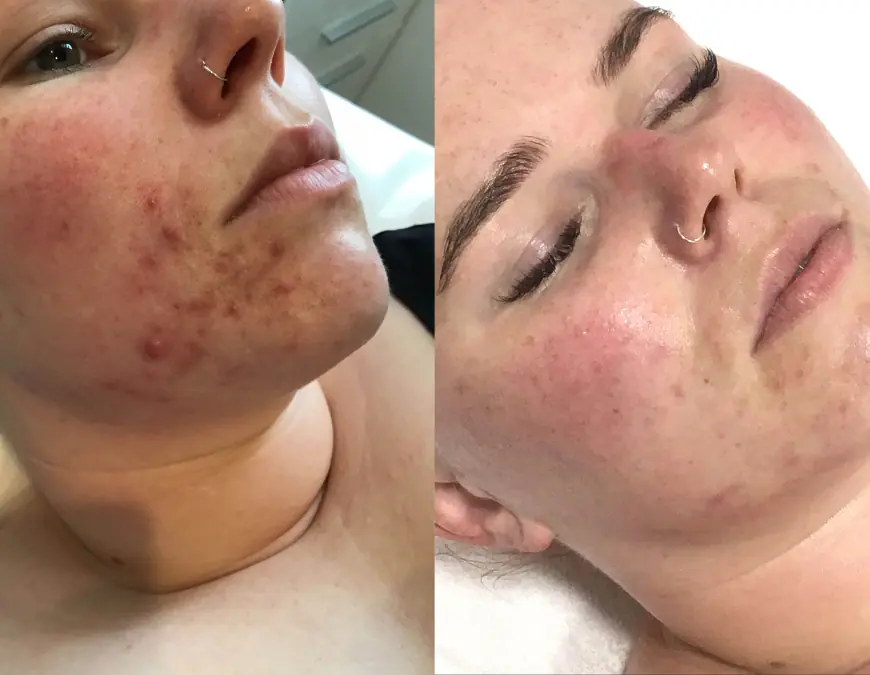Can Acne Treatment Be Done at Home Safely?
Clear your skin with effective acne treatments targeting pimples, blackheads, and breakouts for a smooth, healthy glow.

Acne treatment at home is becoming a widely preferred option for those seeking convenient, affordable, and consistent ways to manage breakouts. Whether you're dealing with occasional pimples or more persistent acne, many home remedies and over-the-counter products offer effective relief. But the key question remains: Can acne treatment be done at home safely? The answer depends on your skin type, the severity of the Acne Treatment In Dubai(علاج حب الشباب في دبي), and the consistency of your skincare routine. In this guide, we’ll explore the effectiveness, safety, and strategies for treating acne from the comfort of your own home.
What is at-home acne treatment and how does it work?
At-home acne treatment refers to the use of non-prescription products and natural remedies to control acne symptoms. This includes topical treatments, gentle cleansing routines, and the application of natural ingredients that can help manage oil, bacteria, and inflammation.
These treatments work by:
-
Unclogging pores and removing excess oil
-
Exfoliating dead skin cells to reduce blockages
-
Targeting acne-causing bacteria with antibacterial ingredients
-
Soothing inflamed skin and supporting healing
Some of the most effective ingredients used in home acne treatment include salicylic acid, benzoyl peroxide, niacinamide, tea tree oil, and aloe vera. These components are often found in face washes, toners, masks, or spot treatments.
Importance of safe home acne treatment:
For many people, especially those with mild to moderate acne, managing breakouts at home is both practical and effective. The importance of acne treatment at home lies in its ability to provide early intervention and build long-term habits for clear skin. Moreover, it offers a level of privacy and control that in-office treatments may not.
Here’s why it matters:
-
Immediate access to treatment options
-
Helps establish a consistent skincare routine
-
Reduces the chances of acne worsening
-
Teaches individuals to understand their skin triggers
-
Encourages proactive skincare behavior
Many users ask: Can I treat hormonal acne at home? – Mild hormonal breakouts may be managed with anti-inflammatory ingredients, but persistent issues might require more advanced care.
Types of acne treatments you can do at home:
There’s a wide range of at-home acne treatment options, from chemical-based solutions to natural DIY remedies. Choosing the right type depends on your skin sensitivity, acne type, and personal preferences.
Common at-home treatments include:
-
Topical over-the-counter creams and gels: Often contain benzoyl peroxide or salicylic acid
-
Cleansers and exfoliants: Designed to remove oil and dead skin cells
-
Face masks: Clay, charcoal, or sulfur-based masks help detoxify the skin
-
Natural remedies: Such as honey, green tea, and diluted apple cider vinegar
-
Hydrating moisturizers: Especially those with hyaluronic acid and niacinamide
-
LED light therapy devices: Increasingly popular for treating acne-causing bacteria
Some users also inquire: Is it safe to pop pimples at home? – It’s generally discouraged as it can lead to scarring, infections, and inflammation.
Preparation and aftercare for home acne routines:
Before starting any home acne regimen, preparing your skin and following up with proper care is crucial. Without a careful approach, even gentle products may lead to dryness, irritation, or flare-ups.
Steps for preparation:
-
Cleanse your face with a gentle, non-comedogenic cleanser
-
Pat dry with a clean towel
-
Apply any treatments or serums as directed
-
Always follow with a lightweight moisturizer
Aftercare tips:
-
Use sunscreen daily to protect your skin
-
Avoid mixing too many active ingredients at once
-
Keep your hands and face clean
-
Change pillowcases regularly to prevent bacteria buildup
A common user question is: Can I use multiple acne products at once? – It’s best to start with one product and introduce others gradually to avoid overwhelming the skin.
Who is the ideal candidate for home treatment?
Home acne treatment isn’t suitable for everyone, especially those with severe or cystic acne. However, it works well for a large portion of individuals with manageable skin issues.
Ideal candidates:
-
People with mild to moderate acne
-
Those with sensitive or combination skin types
-
Individuals looking to maintain or prevent breakouts
-
Anyone willing to follow a consistent skincare routine
Not ideal for:
-
Those experiencing painful cystic nodules
-
Users with acne scarring needing advanced treatment
-
People with known skin allergies to topical ingredients
User query: Is at-home acne treatment safe for teens? – Yes, many gentle OTC products are safe for teens, especially those formulated for young, oily skin.
How to choose the right home acne treatment products?
Choosing the right Acne Treatment(علاج حب الشباب) for home use involves reading labels, knowing your skin type, and starting with proven ingredients. Avoid jumping into trending products without understanding how they work.
Tips to choose correctly:
-
Look for non-comedogenic, fragrance-free formulas
-
Check active ingredient strength (2% salicylic acid or 2.5% benzoyl peroxide are good starting points)
-
Pick lightweight gel-based moisturizers if you have oily skin
-
Consider using soothing ingredients like centella asiatica or green tea if your skin is sensitive
One of the most common questions is: How long does home acne treatment take to work? – Results vary, but noticeable improvements often appear within 4 to 6 weeks of consistent use.
Risks and benefits of treating acne at home:
While there are clear advantages, at-home acne care also carries some risks if done improperly. Awareness is key to avoiding unwanted side effects.
Benefits:
-
Easy to incorporate into your daily routine
-
More control over the products you use
-
Accessible and less intimidating than in-office treatments
-
Encourages long-term skin maintenance habits
Risks:
-
Overuse of harsh ingredients can damage the skin barrier
-
DIY treatments may cause irritation or allergic reactions
-
Misidentifying your acne type can lead to ineffective results
-
Lack of consistency can result in no improvement
User curiosity: Can natural remedies cure acne permanently? – Natural options may help reduce symptoms but typically need to be paired with lifestyle adjustments for lasting results.
Frequently asked questions:
Can home treatments cause purging?
Yes, introducing active ingredients like salicylic acid or retinoids may cause temporary breakouts as pores clear.
Are clay masks good for all skin types?
Clay masks are best for oily or combination skin. Dry skin types may need a hydrating formula.
Is ice good for acne?
Applying ice can reduce inflammation and redness, making it a great short-term relief method.
What should I avoid during home treatment?
Avoid touching your face, over-washing, or using alcohol-based toners, which can dry out and irritate the skin.
Do I need to change my diet?
A balanced diet rich in antioxidants and low in sugar may help improve acne, but results can vary from person to person.
Conclusion:
Acne treatment at home can be done safely and effectively when backed by the right knowledge, patience, and consistent care. From over-the-counter solutions to gentle natural remedies, many options are available for treating breakouts in a non-invasive and personalized way. By understanding your skin type, choosing suitable products, and practicing safe application methods, you can manage acne effectively without leaving home. With proper expectations and commitment, home acne treatment offers a reliable path toward clearer, healthier skin.
What's Your Reaction?
 Like
0
Like
0
 Dislike
0
Dislike
0
 Love
0
Love
0
 Funny
0
Funny
0
 Angry
0
Angry
0
 Sad
0
Sad
0
 Wow
0
Wow
0

















































